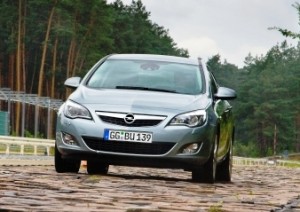The German central government has rejected Opel’s application for loan guarantees, in spite of the fact that €8.5 billion was given to other automakers last year in the European Union to help them get through tough economic times. Opel received nothing.
Opel is currently surviving the ongoing Great Recession and the subsequent collapse of auto markets only because of the largesse of U.S. and Canadian taxpayers who bailed out parent General Motors. This puts GM in a difficult political position on both sides of the Atlantic ocean. And the European market forecast is grim. Most think this year it will be in the 14 to 15 million unit range, down from 15.9 million in 2009.
In the latest development of the ongoing saga, Opel was caught in a squabble that has weakened the coalition government of Chancellor Angela Merkel. German Economic Minister Rainer Bruederle denied GM €1.1 billion (~$1.2 billion) in loan guarantees after six months of work by General Motors on an Opel restructuring that obtained plant closings and other concessions from labor unions. Opel estimates it needs €3.3 billion, but some estimates are higher, including one from the UK government at €3.7 billion. Others are higher still.
Bruederle is a Free Democrat, the minority party in Merkel’s fragile government, which came about after voters – read taxpayers – turned out some of her ruling party’s among other members in the election last September in the midst of the Opel bailout negotiations. Merkel had supported a takeover by Magna, but the GM board rejected that last November, in an unexpected move that was an embarrassment to Germany’s ruling party. (See Strategic Risk for GM was too high to Sell Opel)
It also did not help that GM has now reported an $865 million first-quarter profit — its first positive quarter in three years. The profit came as global auto sales turned up. Nonetheless, GM lost $506 million in Europe, and it was the only region where GM lost money.
Bruederle said he was convinced that GM has “sufficient funds” to carry out its restructuring plans.
Opel CEO Nick Reilly was restrained in his comments on a conference call with journalists saying, “I’m naturally disappointed that after such a long process we have received a negative answer from the German government.”
Reilly also claimed there was no threat of bankruptcy, but hedged with “I’m not saying we don’t need liquid funds.” It appears Opel is solvent through the end of the year.
Those funds could be forthcoming from the four individual German states where Opel has operations employing 25,000 – Hesse, North Rhine-Westphalia, Thueringia and Rhineland-Palatinate.
The United Kingdom and the Spanish Central governments are also ready to guarantee the loans Opel needs to complete its restructuring and fund new vehicles.
General Motors could slow down product development at Opel in the interim, and hope that the European car market starts to revive and cash flow picks up. A new Meriva model is about to be introduced in a segment Opel dominates.
Oh, and then there are taxpayers on this side of the Atlantic Ocean. Reilly also said, “I’m confident the parent company will see us through.”
(See also First Look: The 2011 Buick Regal, which is imported from Opel. And GM Board Balks and Decides to Retain Opel!)

